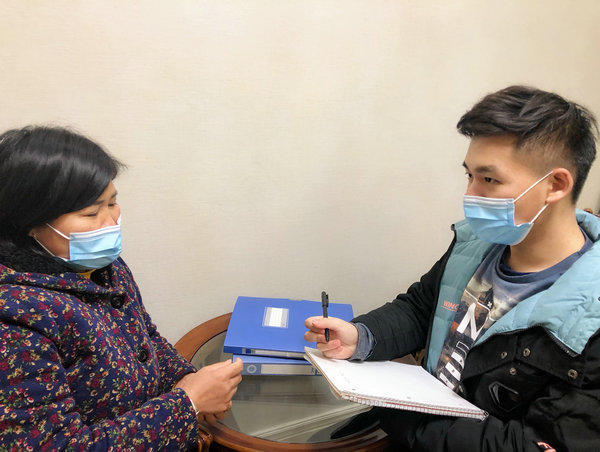 |
|
An Songsong (right) provides emotional support to a family member of a patient in Chongqing. [Photo provided to China Daily] |
Helping hand
As an active member of the group, An, 24, is responsible for establishing and managing 34 local groups and one overseas Chinese group on social media.
He explains the need to form groups based on location. "We establish local groups in each provincial administrative unit and spread information according to distinctive features of a place. For example, our Inner Mongolia group publishes a Mongolian version of our work so that local people can easily understand the information."
He continues: "By joining the A2N and hearing many people's stories, I have broadened my horizon and found that many people are in need of help. I want to be their voice."
The A2N focused on refuting rumors at the beginning, but members find the function less urgent now.
"Most people have a basic understanding of the outbreak and are less likely to be misled by rumors today. So we have turned our attention to more practical things such as materials and transportation," says Yang.
The Su Volunteer Group initiated by writer Wu Ang has been working to directly help patients.
Because of limited medical resources in Hubei, Wu noticed many infected people had difficulty getting hospital admission. She established the group in early February and has attracted many volunteers.
They began by searching online for people who needed help and putting their information in the hospital system so that they could be admitted eventually for treatment.
Wu says the group had nearly 700 volunteers by Feb 14, including 258 from Wuhan.
So far, they have collected the information of 1,161 sick people, and helped 396 families to apply for hospitalization, 324 of whom have been admitted.
The Su Volunteer Group has a subgroup to locate patients and another to register their symptoms before hospitalization. For each family with patients, volunteers set up a WeChat group so that it is easy to contact them and know about their condition in time.
Another subgroup has volunteers who are doctors and nurses, and they can answer questions from patients, comfort them and offer suggestions.
Many members of the Su Volunteer Group were born in the 1990s.
"The young people give me hope," says Wu.
"A Wuhan volunteer in our group whose family member died of the virus has shared details of the treatment, as well as highlighted matters that need attention and gave information about how to get medicine," she adds.
The volunteers are working tirelessly, some for nearly 18 hours a day.
"I feel comforted by making this contribution. I have also invited my friends to join. When we work together, though we have different opinions at times, our priority is to help save people," says Sang Gege, a member of the Su Volunteer Group.
"The group members seldom greet each other or chat. Everyone is busy. For us, trust and efficiency are the most important things, which help us to conquer difficulties and give us more confidence."
Through his work with the A2N, An got in touch with a medical worker in his hometown, Chongqing, who told him that although medical conditions had improved in hospitals, the mental health of many patients and their family members was still weak.
"I realized I could help people in my hometown as well after talking with the medical worker. We can do various things to help," says An.